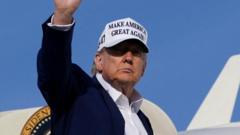This website uses cookies so that we can provide you with the best user experience possible. Cookie information is stored in your browser and performs functions such as recognising you when you return to our website and helping our team to understand which sections of the website you find most interesting and useful.


US President Donald Trump has agreed to extend a deadline to negotiate tariffs with the European Union until 9 July.
It comes after President of the European Commission Ursula von der Leyen said she had a "good call" with Trump on Sunday.
Last month, Trump announced a 20% tariff on most EU goods, but later halved it to 10% until 8 July to allow time for negotiations. On Friday, Trump expressed frustration with the pace of negotiations with the EU and threatened to impose 50% tariffs.
Speaking to reporters, Trump said Von der Leyen told him "we will rapidly get together and see if we can work something out", posting later on Truth Social that it was his "privilege to extend the deadline".
Von der Leyen earlier said she was ready to move "swiftly" to agree a trade deal with the US, but that the bloc needed until 9 July to agree a "good deal".
In remarks to reporters at the White House on Friday afternoon hours before talks with the bloc, Trump said he planned to raise tariffs on all goods sent to the US from the EU to 50% by 1 June, citing impatience at negotiations.
Later on Friday, the EU's trade chief Maroš Šefčovič reaffirmed the bloc's commitment to securing a fair deal.
Following a call with US Trade Representative Jamieson Greer and Commerce Secretary Howard Lutnick, he said: "The EU's fully engaged, committed to securing a deal that works for both."
He continued: "EU-US trade is unmatched and must be guided by mutual respect, not threats. We stand ready to defend our interests."
Trump has long criticised what he views as an unfair trade relationship with the EU, despite the bloc being one of Washington's largest trading partners. Last year, the EU exported more than $600bn (€528bn; £443bn) in goods to the US while importing $370bn worth, according to US government data.
The president has specifically raised concerns on trade in cars and agricultural goods. Although some tariffs were paused earlier this year to allow for negotiations, a 25% levy on EU steel and aluminium remains in place.
European leaders continue to warn against escalation. France and Germany have called for a diplomatic solution, stressing that tariffs would harm both economies.
The EU has threatened - and paused - its own measures against the US.
It said it would introduce a 25% tariff on €18bn ($20bn; £15bn) worth of US goods coming into Europe but this was put on hold.
The bloc is also currently consulting on additional measures against US imports into the US valued at €95bn.



 Africana55 Radio
Africana55 Radio 
